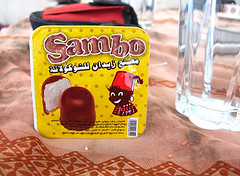Are we – Arabs – racist? It's really hard to tell. Some might argue that racism is against our religion, and that people are never discriminated against because of their skin colour. On the other hand, other tiny aspects of our lives might prove that we are. It seems to be normal, for instance, to make fun of black people [Ar] [1] in the cinema, and even call a candy “The Slave's Head” because of its colour.
Jordanian blogger Roba Al-Assi, wrote about the name given to the marshmallow chocolate in that part of the world [2].
I know that the word “slave” by no means has the same implications in Arabic as it does in English. Yet, I can’t be less amused by the name of the marshmallow chocolate “Ras ilabed”, literally meaning “the head of the slave”.
It seems that the candy producers had the same feeling like Roba. Hussein Wehbe wrote in his blog about Ghandour, one of the candy's producers who decided to rename their product [3].

Sambo, the new name for Slave Head. Photo taken from Roba Al-Assi Flickr account under Creative Commons license Attribution-NonCommercial-ShareAlike 2.0 Generic (CC BY-NC-SA 2.0)
Another producer of the same candy has also renamed its product. But Roba Al-Assi found the new name and package even more racist [2].
I know that we Arabs look at racism with a grain of salt, but should this really be okay in this day and age? Aside from being insensitive, I also think it portrays a terribly wrong message for the hoards of children indulging in this delicious dessert.
I say… Keep the name, but lose the racist visuals.
Lebanese blogger, Farfahinne, shares a story about journalist “Khaled Sagheya” [4], who wrote here about how they used to call a black woman who used to sell them toys and T-shirts with “Disney characters [5]” and “The Smurfs [6]” “the slave”.
وكانت «العبدة» تحبّنا أيضاً. تنظر إلينا، نحن الذين لم نبلغ العاشرة بعد، وتقول: «هيدول زبوناتي». لم أشعر وقتها بأنّ ثمّة ما هو خاطئ في تسميتي لصاحبة الدكان. كنت أدعوها «العبدة» بحبّ واحترام كاملين. لكن، حين أتذكّر ذلك الآن، أشعر بخجل عميق.
It's hard to limit the issue of discrimination to skin colour only in the Arab world. It's normal for almost every region here to make fun of a part of it's own people. In Egypt, people make fun of those coming from upper Egypt, “Se'ed”. In Lebanon and Syria, the joke is on those coming from “Homs” [7]. And here is a Moroccan cleric who preached against the celebration of the Yennayer/Amazigh New Year [8]. The cleric didn't just stop at the new year's celebrations, but he also preached against the use of the Berbet/Tamazight language and called the Berber people as traitors working for the advancement of Israel and Zionism [Ar] [9]. Finally, sometime the joking is international, like the case here where a couple of Egyptian movies poke fun at Yemeni or Filipino people. [Ar] [1]